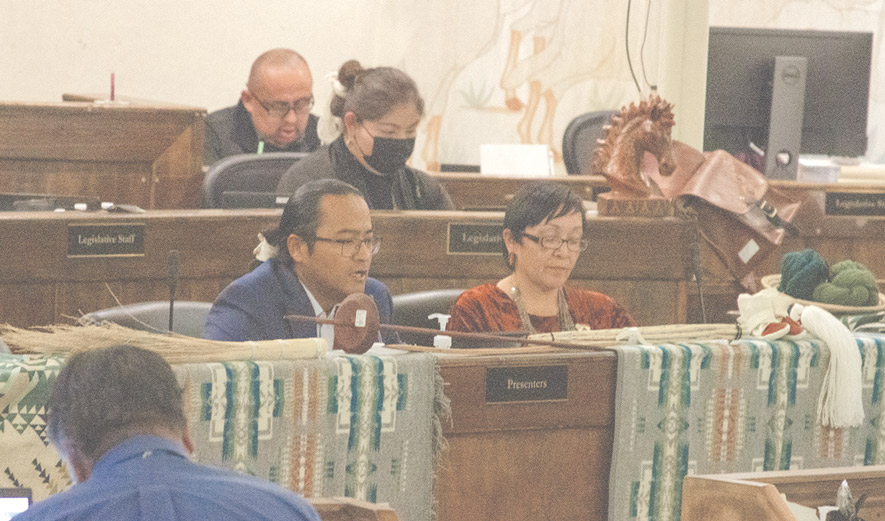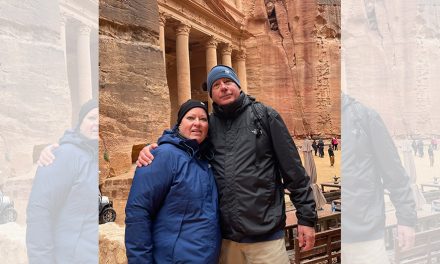
Nygren highlights 6 months in office during State of the Navajo Nation

Navajo Times | Rick Abasta
Vice President Richelle Montoya sits beside Navajo Nation President Buu Nygren as he presents his State of the Navajo Nation Address to the 25th Navajo Nation Council inside the Council Chamber during Summer Session July 17.
WINDOW ROCK
After riding to the Navajo Nation Council Chamber on horseback, President Buu Nygren delivered the State of the Navajo Nation Address July 17.
“It was 100 years ago on July 7, 1923, that the first Council of 22 naat’áanii gathered in Tóháálį́, New Mexico, as the first Navajo Business Council,” he said, noting that Chee Dodge was the first chairman of the Council.
He said this Council-based government was created to make decisions on natural resources, much like today. He said that throughout periods of peace and turmoil, the Council was often in struggle and disagreement with the federal government.
“It has evolved into what is the largest and most highly-developed three-branch tribal government in Indian Country,” he said.
Nygren spoke of his recent testimony in Washington, D.C., and the lack of meaningful consultation from the Department of the Interior’s Chaco Canyon decision regarding the 10-mile buffer zone.
“That decision negatively affects our allottees without any alternative for relief. A true government-to-government relationship must be based on mutual respect,” he said.
Nygren said he had the support of Speaker Crystalyne Curley, the tribal Council, and local communities regarding the Chaco Canyon issue.
“The Navajo Nation is strong, and our pride is self-evident when we stand united,” he said.
100 years of government, securing water rights
The president also spoke of the centennial year of the Navajo Nation Council, which features many strong women leaders such as Speaker Curley, Chief Justice JoAnn Jayne, Associate Justice Eleanor Shirley and six women district court judges, Attorney General Ethel Branch, Deputy Attorney General Heather Clah, and Vice President Richelle Montoya.
“We celebrate a government whose leadership is shared by many strong women leaders,” he said.
Since taking office six months ago, he said the administration has focused on the $2.1 billion ARPA funding. The president touted the creation of 201 new business units, $632 million in new budgets, expending $85 million, and the encumbrance of $171 million.
“That brought us to a total of $888 million either obligated or spent under my leadership,” he said.
He said the Nation wants to see homes built, water and power flowing, students connected to the world of knowledge, and Navajo businesspeople connected to the world of commerce through broadband.
Nygren said the Supreme Court’s 5-4 ruling against the Navajo Nation was not a loss for the tribe.
“We continue to move forward to secure our water rights,” he said.
He said the Supreme Court’s June ruling in favor of the Indian Child Welfare Act affirmed the sovereign rights of tribes to protect their children and allow them to maintain their family and cultural connection to their tribes.
“Now, with this opinion, our Navajo children and their families will continue to be protected,” he said.
Nygren said he was pleased to announce the U.S. Department of Transportation has awarded a $20 million grant to the Navajo Nation from the Rebuilding American Infrastructure with Sustainability and Equity program to reconstruct 7 miles of Navajo Route 15 between Sunrise Springs and Cornfields, Arizona.
“Route 15 is a critical road,” he said.
He also spoke of the MOU signed with the Army Corps of Engineers that established the Albuquerque District as the lead district for the Navajo Nation. He said this single point of contact would streamline future projects.
‘Come back strong’
Nygren reported that the Navajo Engineering and Construction Authority provided a $1 million check to the Navajo Nation for tribal scholarships. He also noted that he had tapped Garret Silversmith to lead the tribal enterprise.
During the Navajo Nation Economic Summit, the president said he announced that business site lease payment relief would be provided for up to 36 months in the interests of small businesses that suffered financial loss during the pandemic.
“We will do all we can to come back strong from the pandemic,” he said.
The president also spoke of the need for veterinarians, highlighting an MOU he executed with the University of Arizona to offer full scholarships to Navajo veterinary science students.
He said the veterinary college will pay half, and the Navajo Nation will pay the other half.
He said the administration is in the final stages of developing a comprehensive salary study for tribal positions. He said the adjustments would reflect cost-of-living adjustments and other changing needs.
The president said 503 jobs had been filled since taking office, a substantial decrease from the 2,100 vacancies in January, adding that the administration’s goal is to recruit to fill the open positions aggressively.
The administration also provided the tribal Council with recommendations to fill vacant seats on enterprise and commission boards, he said, noting that Melissa Begay, an internist, was unanimously confirmed on the Council for the Navajo Agricultural Products Industry Board of Directors.
Nygren said Kim Russell is the new executive director for the Navajo Department of Health, the third candidate appointed to that role since he took office in January.
Operation Tsé’naa Na’ní’áhí, Goulding’s Lodge
He also announced that Operation Rainbow Bridge is the Nation’s response to fraudulent rehab facilities.
“Its purpose was to give our relatives an option to return home or set them up with a trusted provider,” he said.
Tuition waivers provided by Arizona and New Mexico colleges and universities were also discussed during his report, including waivers for tuition at Diné College and Navajo Technical University.
The president requested support to amend the Fiscal Recovery Fund legislation for “needed flexibility.” He pointed to deadlines to obligate funds and the need for divisions to purchase buildings and “other urgently needed items.”
Resources and Development Committee chairwoman Brenda Jesus will sponsor the amendments to CJY-41-21, he said.
Nygren said negotiations to purchase the Goulding’s Monument Valley Lodge and Tours property were successful.
“I initially opposed this purchase,” he said.
The legislation to purchase Goulding’s Lodge for $59.5 million failed to reach the 16-vote threshold needed on July 19.
Nygren said the tribe and the Navajo Nation Hospitality Enterprise reached a profit-sharing agreement with projected profits of $7.4 million to pour into tribal coffers annually four years after the purchase.
He also reported on the Diné Action Plan, approved by Council in September 2021, but was unfunded. The president said $500,000 was needed to create the new Office of Diné Action, adding that Thomas Cody of the Division of Social Services will be the project lead.
Finally, the president spoke of the need to open public facilities year round to benefit families and youth. He said using buildings, offices, gyms, community centers, and playgrounds was hampered by insurance requirements.
“Keeping these gathering places closed says we don’t trust our Navajo people. That’s not true, and I reject that premise,” he said.
Nygren also thanked the students interning for the tribal government over the summer.
“You have endless possibilities to positively impact the lives of our people working with my administration,” he said before ending his report to tribal legislators.








 Highway 264,
Highway 264, I-40, WB @ Winslow
I-40, WB @ Winslow